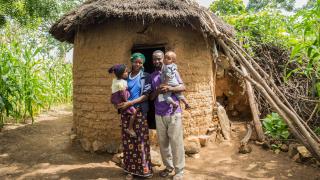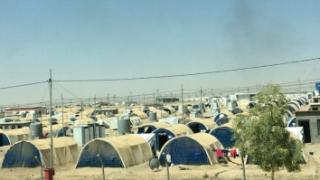Launching the UK’s National Action Plan on Women, Peace and Security
When it comes to protecting women’s rights in conflict-affected countries, it’s time to turn resolutions into reality. The UK’s new Plan is a step in the right direction
From Syria to South Sudan, conflict continues to foster violence all over the world today, predominantly carried out by men and targeted at women. At the same time, progress on key women’s rights protections falls consistently short. It affects women’s lives every day - I see this in my work with Women for Women International. In Afghanistan, 87.1% of participants on our year-long training programme report never having attended formal education, earn less than $10 a month, and more than three-quarters report no knowledge of their rights. Meanwhile, only 2 of 23 rounds of talks between the Afghan government and the Taleban formally included women, according to the Women and Foreign Policy Forum at the Council of Foreign Relations. Women’s voices are marginalised, so their experiences of violence, abuse and disempowerment are left unaddressed.
Against this backdrop, the UK government yesterday launched its fourth National Action Plan on Women, Peace and Security – a five-year strategy for how it will meet its commitments, under UN Security Council Resolution 1325, to reduce the impact of conflict on women and girls and to promote their inclusion in conflict resolution. The Plan was produced in partnership with civil society, including the Gender Action for Peace and Security (GAPS) network of UK-based NGOs, of which Women for Women International is a member, and of which I am currently Chair. To ensure the voices of women in conflict-affected states were included in the Plan, GAPS member organisations led consultations with women’s rights organisations in Burma, Somalia, Syria, and Afghanistan.
So why is the new National Action Plan important?
For me, it comes down to the words of Sosan Behbodzadah, one of the women who took part in the consultations led by Women for Women International’s team in Afghanistan. She said that, when it comes to matters of women’s participation, safety, and rights protections:
Regulations, resolutions and conventions were all accepted in Afghanistan, but unfortunately all of it has remained only on papers until now.
Data and testimonies from our programme participants tell the same, devastating story of promises that don’t translate into reality. We need to change this.
That is why the Plan is important - it is a clear commitment to women and girls and to spend more aid in fragile and conflict-affected countries. And it is stronger than its predecessors: built on solid collaboration between government and civil society, and on consultations with local women’s rights organisations. It sets a clear direction for the UK government to work towards, which should enable more effective reporting and, crucially, learning. This is a promising and positive start.
But the Plan is only the beginning
What we will DO with it now, is what really matters
As GAPS, we will focus on three areas:
1. Policy coherence
Against competing priorities, whether trade or countering violent extremism, the UK must ensure that efforts in other areas avoid undermining its vital support to women affected by conflict. For example, arms sales to countries like Saudi Arabia, result in these weapons being used against civilians in Yemen, including women.
2. Resourcing
Successful implementation of the Plan is dependent on adequate resourcing, not only in terms of funding but also staffing and capacity-building across government.
3. Continued engagement with women affected by conflict
The UK must continue to regularly talk to, and learn from, the very women who are intended to benefit from its work.
‘Where are the women?’
This last point is critical. Because we are still not asking often, or loudly enough: ‘Where are the women?’
When I spoke at the launch of the Plan yesterday, I told Ministers: every time you travel, ask this question: ‘Where are the women and what are they saying?’ Ensure that you meet with representatives from women’s rights organisations. Listen to what women have to say – and act on it. It is that, which will ensure that the UK has country-specific approaches that are well-informed and are achieving the intended impact.
But it’s not just government ministers who have a role to play in translating the Plan into action. We all have a responsibility to listen, and to act. Each of us here in the UK can now hold our representatives to greater account and make sure they fulfil their clear commitments to women in Afghanistan, Syria, and other countries affected by conflict. It’s an opportunity to stand with other women around the world and create real change, at a time when action is urgently needed.
We could begin by listening to the words of Khawla Dunia, a Syrian participant in our consultations:
“Recognise those brave women, who have been working without being noticed and acknowledged in these very difficult circumstances, whether in the neighbouring countries around Syria or inside Syria. I hope all exiled Syrian women will be able to return to their homes … I hope they will be active and able to contribute to the reconstruction of Syria just as they contributed to the revolution and showed their hope for change.”
Learn more about our work on Women, Peace and Security.
Continue reading
Women for Women International and 20-first are tackling gender inequality and discrimination from countries affected by conflict to boardrooms and homes across the West, making equality everyone's business.
Katie shares her experience in Erbil, Kurdistan Region of Iraq.
Secretary Hillary Rodham Clinton sat down with CNN’s Chief International Correspondent Christiane Amanpour at our annual Luncheon to discuss the importance of women's involvement in peace and security around the world.



